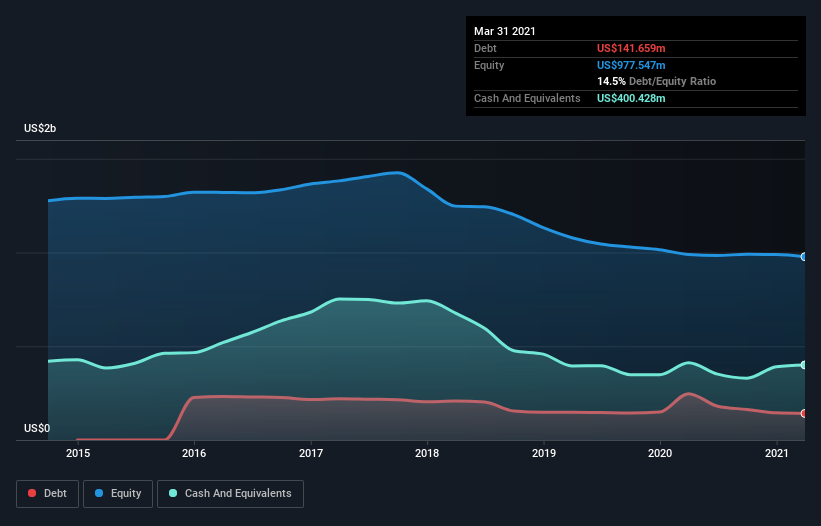Benchmark Electronics (NYSE:BHE) Could Easily Take On More Debt
Legendary fund manager Li Lu (who Charlie Munger backed) once said, 'The biggest investment risk is not the volatility of prices, but whether you will suffer a permanent loss of capital.' It's only natural to consider a company's balance sheet when you examine how risky it is, since debt is often involved when a business collapses. We can see that Benchmark Electronics, Inc. (NYSE:BHE) does use debt in its business. But the real question is whether this debt is making the company risky.
What Risk Does Debt Bring?
Debt assists a business until the business has trouble paying it off, either with new capital or with free cash flow. In the worst case scenario, a company can go bankrupt if it cannot pay its creditors. However, a more usual (but still expensive) situation is where a company must dilute shareholders at a cheap share price simply to get debt under control. Having said that, the most common situation is where a company manages its debt reasonably well - and to its own advantage. When we think about a company's use of debt, we first look at cash and debt together.
View our latest analysis for Benchmark Electronics
What Is Benchmark Electronics's Debt?
As you can see below, Benchmark Electronics had US$141.7m of debt at March 2021, down from US$247.3m a year prior. But it also has US$400.4m in cash to offset that, meaning it has US$258.8m net cash.
How Strong Is Benchmark Electronics' Balance Sheet?
The latest balance sheet data shows that Benchmark Electronics had liabilities of US$505.1m due within a year, and liabilities of US$278.1m falling due after that. Offsetting these obligations, it had cash of US$400.4m as well as receivables valued at US$425.4m due within 12 months. So it can boast US$42.6m more liquid assets than total liabilities.
This surplus suggests that Benchmark Electronics has a conservative balance sheet, and could probably eliminate its debt without much difficulty. Succinctly put, Benchmark Electronics boasts net cash, so it's fair to say it does not have a heavy debt load!
We saw Benchmark Electronics grow its EBIT by 6.5% in the last twelve months. Whilst that hardly knocks our socks off it is a positive when it comes to debt. When analysing debt levels, the balance sheet is the obvious place to start. But ultimately the future profitability of the business will decide if Benchmark Electronics can strengthen its balance sheet over time. So if you want to see what the professionals think, you might find this free report on analyst profit forecasts to be interesting.
Finally, a company can only pay off debt with cold hard cash, not accounting profits. While Benchmark Electronics has net cash on its balance sheet, it's still worth taking a look at its ability to convert earnings before interest and tax (EBIT) to free cash flow, to help us understand how quickly it is building (or eroding) that cash balance. Happily for any shareholders, Benchmark Electronics actually produced more free cash flow than EBIT over the last three years. There's nothing better than incoming cash when it comes to staying in your lenders' good graces.
Summing up
While it is always sensible to investigate a company's debt, in this case Benchmark Electronics has US$258.8m in net cash and a decent-looking balance sheet. The cherry on top was that in converted 117% of that EBIT to free cash flow, bringing in US$127m. So we don't think Benchmark Electronics's use of debt is risky. There's no doubt that we learn most about debt from the balance sheet. However, not all investment risk resides within the balance sheet - far from it. For example - Benchmark Electronics has 2 warning signs we think you should be aware of.
If, after all that, you're more interested in a fast growing company with a rock-solid balance sheet, then check out our list of net cash growth stocks without delay.
This article by Simply Wall St is general in nature. It does not constitute a recommendation to buy or sell any stock, and does not take account of your objectives, or your financial situation. We aim to bring you long-term focused analysis driven by fundamental data. Note that our analysis may not factor in the latest price-sensitive company announcements or qualitative material. Simply Wall St has no position in any stocks mentioned.
Have feedback on this article? Concerned about the content? Get in touch with us directly. Alternatively, email editorial-team (at) simplywallst.com.

